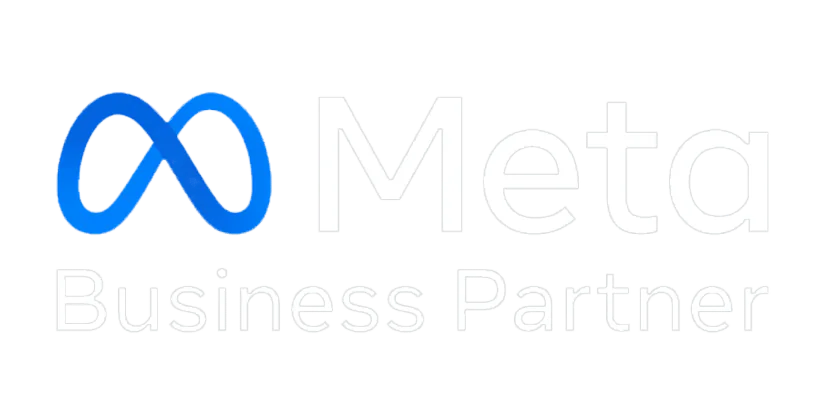WhatsApp Marketing Strategies for D2C Brands: Unlock Growth with TheBotmode
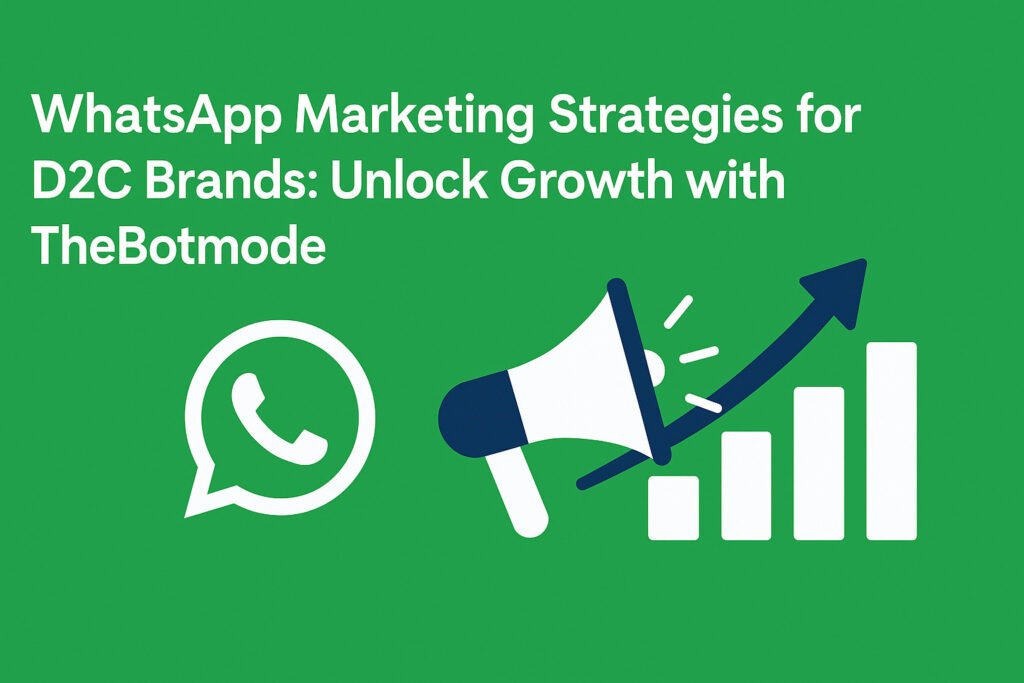
WhatsApp has evolved far beyond a simple messaging app. With over 2 billion users, it is now an essential tool for businesses to connect, engage, and convert customers. For D2C (Direct-to-Consumer) brands, WhatsApp Marketing is not just an option—it’s a powerful channel to drive meaningful customer relationships and increase sales. At TheBotmode, we specialize in helping businesses unlock the full potential of WhatsApp Marketing through innovative strategies designed to deliver real results. In this guide, you’ll discover powerful WhatsApp Marketing strategies to elevate your brand’s communication, drive customer engagement, and boost ROI. What is WhatsApp Marketing for D2C Brands? WhatsApp Marketing is a form of direct messaging that allows D2C brands to communicate with their customers via WhatsApp. It involves sending personalized promotional messages, updates, reminders, customer support, and even processing orders—all within a single app. Using features like the WhatsApp Business API, automated chatbots, and broadcast messaging, businesses can scale communication while maintaining a personal touch, which is crucial for D2C brands aiming for higher customer engagement. Why WhatsApp Marketing is Essential for D2C Brands Whether you’re a startup or an established enterprise, WhatsApp Marketing strategies can help you create authentic relationships with your customers, improve retention, and drive measurable results. Top WhatsApp Marketing Strategies That Actually Work for D2C Brands 1. Use WhatsApp Business API for Scalability For D2C brands looking to handle thousands of messages daily, the WhatsApp Business API is a game-changer. It enables automation, integrates seamlessly with your CRM, and supports chatbot functionality. At TheBotmode, we help you set up and manage the API effortlessly, ensuring that your brand can scale communication without losing its personal touch. 2. Set Up Automated WhatsApp Chatbots Don’t let your customers wait. AI-powered chatbots engage leads instantly, answer FAQs, and even guide users through the sales funnel 24/7. This strategy is crucial for lead nurturing and customer support, allowing D2C brands to keep customers engaged and satisfied. 3. Segment and Personalize Your Broadcast Lists Avoid sounding like spam by segmenting your audience based on behavior, location, or purchase history. Personalized broadcast messages see higher engagement and conversions. Tailor your message for each segment, ensuring your communication feels relevant and timely. 4. Leverage Interactive Buttons & Quick Replies Make your messages more actionable by adding clickable buttons, product catalogs, and quick replies. These interactive features not only improve the user experience but also boost CTR (Click-Through Rates), encouraging customers to take action immediately. 5. Integrate WhatsApp With Your Website & Ads Add Click-to-WhatsApp buttons on your website or run Facebook/Instagram ads that open directly in WhatsApp. This seamless transition helps improve conversions and simplifies lead capture, making it easier for customers to reach out and inquire about products or services. How TheBotmode Helps with WhatsApp Marketing At TheBotmode, we provide end-to-end WhatsApp Marketing services tailored to your business goals. Whether it’s chatbot setup, campaign management, API integration, or analytics, we’ve got you covered. Our platform is user-friendly, scalable, and backed by a team of marketing professionals who live and breathe WhatsApp Marketing strategies. We work with you to implement effective strategies, track performance, and continuously optimize your campaigns for better results. FAQs Q1. Is WhatsApp Marketing Legal? Yes, WhatsApp Marketing is legal as long as you obtain user consent before messaging and follow WhatsApp’s commerce policy. It’s important to comply with WhatsApp’s guidelines to avoid account suspension. Q2. Can Small D2C Businesses Use WhatsApp Marketing? Absolutely! Small D2C businesses can use the WhatsApp Business App or API to easily reach their audience and enhance customer communication. Q3. What Types of Messages Can I Send via WhatsApp Marketing? You can send a variety of messages, including order updates, promotions, product catalogs, reminders, surveys, and customer service messages. The key is to keep the content personalized and relevant to the recipient. Q4. How is TheBotmode Different from Other WhatsApp Marketing Platforms? TheBotmode stands out with its user-friendly dashboard, powerful automation tools, and expert support. We provide a no-code platform that allows business owners and marketers to manage campaigns without a technical background. Q5. Do I Need a Developer to Use TheBotmode? Not at all! Our platform is designed to be no-code, making it accessible to marketers and business owners without the need for technical expertise. Our team is also available to offer support whenever needed. Conclusion: Start Your WhatsApp Marketing Journey Today WhatsApp Marketing offers a huge opportunity for D2C brands to enhance engagement, streamline customer service, and boost conversions. With TheBotmode by your side, you can easily implement these powerful strategies, scale your communication, and achieve your marketing goals. Ready to unlock the power of WhatsApp Marketing? Start growing your business today with TheBotmode!
Customer Support Efficiency with WhatsApp Chatbots
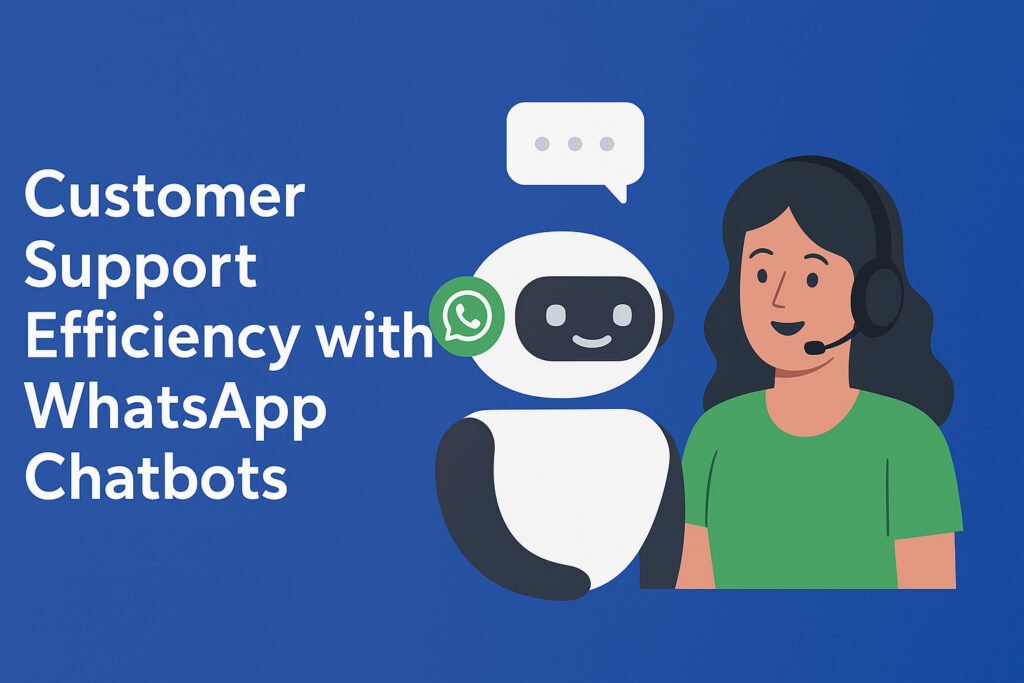
How D2C Brands Can Grow Customer Support Efficiency with WhatsApp Chatbots Introduction For direct-to-consumer (D2C) brands, the pressure to deliver fast, personalized, and consistent customer support is at an all-time high. Customers expect instant replies, 24/7 service, and a seamless experience. The challenge? Doing it all at scale—without ballooning support costs. That’s where WhatsApp chatbots come in. With over 2 billion active users and an open rate of 98%, WhatsApp is the platform where your customers already are. Integrating chatbots into your WhatsApp support strategy empowers your brand to deliver high-efficiency support at scale, without sacrificing personalization. Why WhatsApp Chatbots Matter for D2C Brands WhatsApp isn’t just another messaging app—it’s a customer engagement goldmine. Here’s why: For D2C brands, WhatsApp offers a frictionless channel to manage support, orders, updates, and more—all in one conversational thread. Core Benefits for Support Efficiency 24/7 Instant Responses WhatsApp chatbots never sleep. They can instantly handle FAQs, order inquiries, returns, and common service issues around the clock—no wait time, no frustration. Scalability Without Staffing Increases Your support team can only handle so many queries. A chatbot can handle hundreds simultaneously, reducing wait times and improving resolution rates without growing headcount. Automation Cuts Costs & Boosts Productivity Automating repetitive tasks like tracking updates, FAQs, or product inquiries can save up to 30% in support costs, letting your human agents focus on higher-value conversations. Personalization & Contextual Support at Scale With access to customer data like order history, preferences, and name, WhatsApp chatbots provide contextual, human-like experiences, boosting customer satisfaction while still being automated. Key Features & Best Practices to Implement FAQ Knowledge Base & NLP Integration Train your chatbot with a well-curated FAQ and Natural Language Processing (NLP) for accurate, conversational responses that feel natural. Seamless Chatbot-to-Human Handover When issues get complex, your bot should instantly escalate to a human agent—without losing the context—ensuring a smooth, frustration-free transition. Order Tracking and Real-Time Updates Let customers check their order status, shipping progress, and delivery ETA directly in WhatsApp—automatically and in real-time. Soliciting Feedback & Capturing Insights Use post-conversation surveys or rating prompts within the chatbot to collect valuable feedback and continuously optimize the customer experience. Conversational Commerce & Recommendations Drive revenue during support conversations. WhatsApp chatbots can make personalized product recommendations, recover abandoned carts, and upsell based on chat context. Integrating with CRM & Helpdesk Systems For seamless continuity, integrate WhatsApp with your CRM and helpdesk platforms. This keeps every interaction logged and accessible, ensuring full context across all support touchpoints. Implementation Roadmap for D2C Brands Conclusion For D2C brands striving to scale efficiently, WhatsApp chatbots are no longer a nice-to-have—they’re essential. They deliver instant, automated, and personalized support while slashing costs and improving customer satisfaction. With the right strategy and tools, your brand can handle thousands of conversations without missing a beat. Want to start optimizing your customer service and support? 👉 Explore our guide here.
How to Sell Directly on WhatsApp Using Product Catalogs
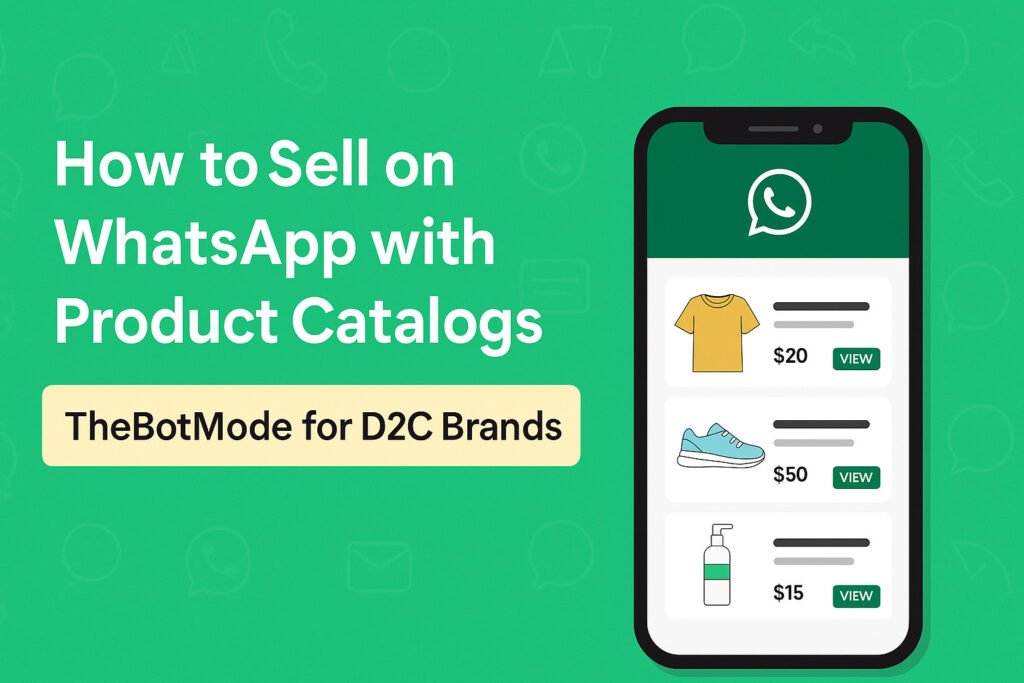
WhatsApp for D2C Brands Is Not Just Messaging In today’s fast-moving D2C world, convenience drives conversion. With over 2 billion users globally, WhatsApp is no longer just a messaging app—it’s a full-fledged commerce channel. Thanks to WhatsApp product catalogs, brands can now showcase products, receive orders, and even collect payments—all within a single chat thread. In this blog, we’ll explore how D2C brands can sell directly on WhatsApp using product catalogs—and how platforms like TheBotMode make this seamless and scalable. What Is a WhatsApp Product Catalog? A WhatsApp product catalog acts as a mobile storefront inside your business profile. It allows you to display product images, pricing, descriptions, and purchase links—all within WhatsApp. Customers can browse your products and add items to their cart without leaving the app, reducing friction and increasing the likelihood of purchase. Why D2C Brands Should Use WhatsApp Product Catalogs Faster Purchase Decisions In-chat browsing reduces drop-offs and decision fatigue. Zero Learning Curve No new apps or websites—WhatsApp is already familiar to your audience. Higher Engagement Product discovery and conversations happen in one place. Wider Geo-Reach From metros to Tier 3 towns, WhatsApp is where your customers are. Lower CAC By selling directly, you reduce reliance on ads and third-party marketplaces. How to Set Up a WhatsApp Product Catalog 1. Choose the Right WhatsApp Business Tool 2. Create Your Catalog 3. Organize with Categories Group similar items together (e.g., T-Shirts, Footwear, Skincare) to make browsing easier. 4. Share Products in Chat When chatting with a customer, tap the “attachment” icon → Catalog → Select product to send it instantly. TheBotMode Advantage: Supercharge Your WhatsApp Storefront While WhatsApp’s native features are useful, TheBotMode turns your catalog into a powerful D2C sales machine. Auto-sync catalogs from Shopify, WooCommerce, or custom websitesAI-driven recommendations based on user chat behaviorCart & Checkout functionality within WhatsAppPayment gateway integration (Razorpay, Stripe, etc.)Multi-agent support for high-volume teamsOrder tracking and post-sale automation Tips to Maximize Sales with WhatsApp Catalogs Use Quick Replies for FAQs (e.g., shipping, returns, sizes)Leverage Broadcasts to announce new arrivals or offersAutomate Reminders for users who viewed products but didn’t purchaseTrack Engagement to identify best-selling or low-performing productsPersonalize suggestions based on past interactions or preferences Turn WhatsApp Into Your Top D2C Sales Channel WhatsApp product catalogs are a game-changer for D2C brands seeking to streamline the shopping experience. With platforms like TheBotMode, you can go beyond a basic catalog and build an automated, intelligent, and conversion-optimized commerce experience—right inside WhatsApp. If you’re ready to turn conversations into conversions, now is the time to integrate your product catalog and start selling where your customers already are. FAQs Q1. Can I connect my Shopify store with WhatsApp catalogs? Yes! TheBotMode enables auto-sync of your Shopify product listings directly to WhatsApp via the Business API. Q2. Is WhatsApp Catalog available in all countries? Yes, it is available globally. However, features may vary slightly depending on the region. WhatsApp catalogs are widely supported in India, Southeast Asia, the Middle East, and Latin America. Q3. Can customers place orders directly on WhatsApp? Yes. With Business API automation, you can allow product
Grow Customer Support Efficiency with WhatsApp Chatbots
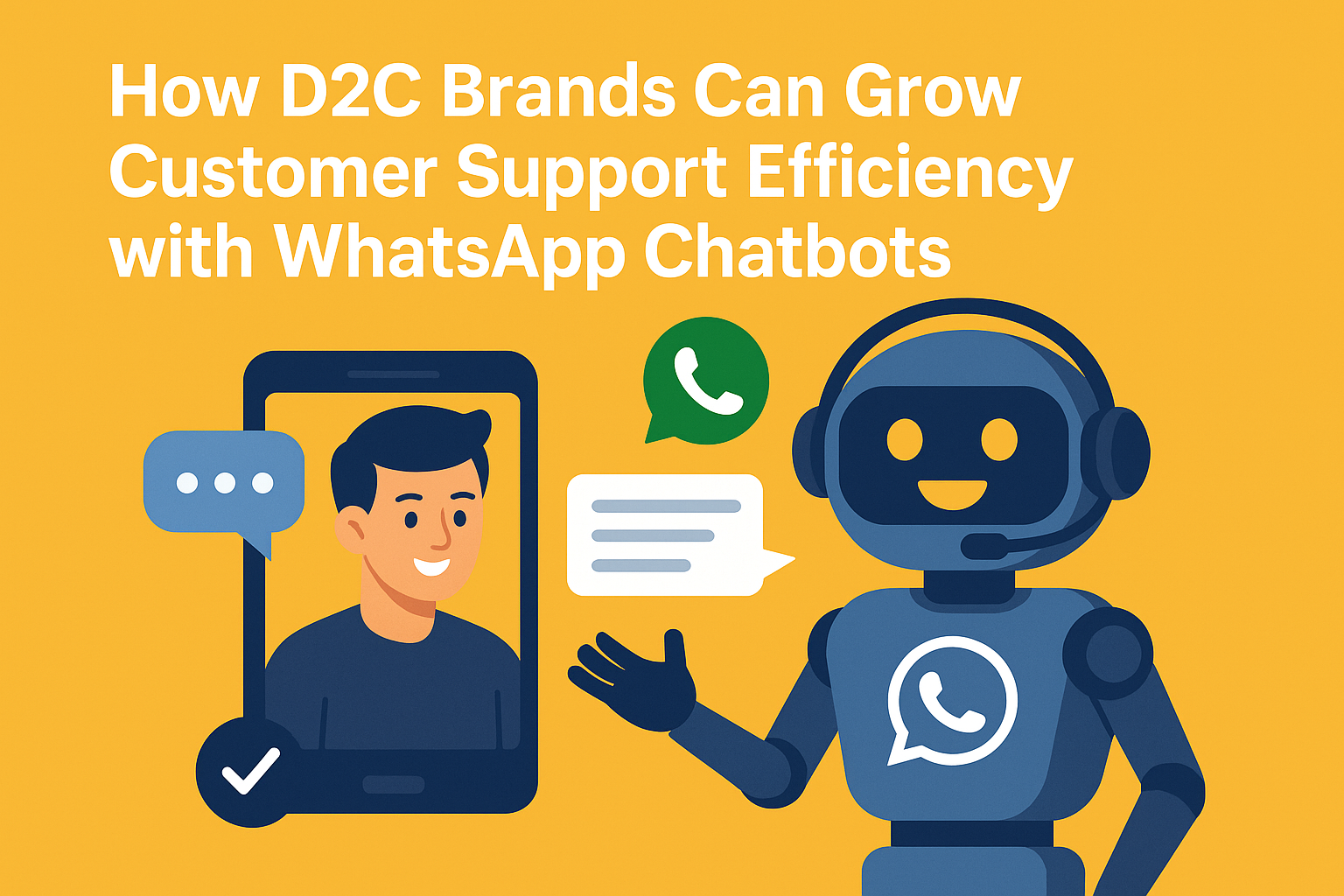
How D2C Brands Can Grow Customer Support Efficiency with WhatsApp Chatbot Introduction For direct-to-consumer (D2C) brands, the pressure to deliver fast, personalized, and consistent customer support is at an all-time high. Customers expect instant replies, 24/7 service, and a seamless experience. The challenge? Doing it all at scale—without ballooning support costs. That’s where WhatsApp chatbots come in. With over 2 billion active users and an open rate of 98%, WhatsApp is the platform where your customers already are. Integrating chatbots into your WhatsApp support strategy empowers your brand to deliver high-efficiency support at scale, without sacrificing personalization. Why WhatsApp Chatbots Matter for D2C Brands WhatsApp isn’t just another messaging app—it’s a customer engagement goldmine. Here’s why: For D2C brands, WhatsApp offers a frictionless channel to manage support, orders, updates, and more—all in one conversational thread. Core Benefits for Support Efficiency 24/7 Instant Responses WhatsApp chatbots never sleep. They can instantly handle FAQs, order inquiries, returns, and common service issues around the clock—no wait time, no frustration. Scalability Without Staffing Increases Your support team can only handle so many queries. A chatbot can handle hundreds simultaneously, reducing wait times and improving resolution rates without growing headcount. Automation Cuts Costs & Boosts Productivity Automating repetitive tasks like tracking updates, FAQs, or product inquiries can save up to 30% in support costs, letting your human agents focus on higher-value conversations. Personalization & Contextual Support at Scale With access to customer data like order history, preferences, and name, WhatsApp chatbots provide contextual, human-like experiences, boosting customer satisfaction while still being automated. Key Features & Best Practices to Implement FAQ Knowledge Base & NLP Integration Train your chatbot with a well-curated FAQ and Natural Language Processing (NLP) for accurate, conversational responses that feel natural. Seamless Chatbot-to-Human Handover When issues get complex, your bot should instantly escalate to a human agent—without losing the context—ensuring a smooth, frustration-free transition. Order Tracking and Real-Time Updates Let customers check their order status, shipping progress, and delivery ETA directly in WhatsApp—automatically and in real-time. Soliciting Feedback & Capturing Insights Use post-conversation surveys or rating prompts within the chatbot to collect valuable feedback and continuously optimize the customer experience. Conversational Commerce & Recommendations Drive revenue during support conversations. WhatsApp chatbots can make personalized product recommendations, recover abandoned carts, and upsell based on chat context. Integrating with CRM & Helpdesk Systems For seamless continuity, integrate WhatsApp with your CRM and helpdesk platforms. This keeps every interaction logged and accessible, ensuring full context across all support touchpoints. Implementation Roadmap for D2C Brands Conclusion For D2C brands striving to scale efficiently, WhatsApp chatbots are no longer a nice-to-have—they’re essential. They deliver instant, automated, and personalized support while slashing costs and improving customer satisfaction. With the right strategy and tools, your brand can handle thousands of conversations without missing a beat. Want to start optimizing your customer service and support? 👉 Explore our guide here.
5 Ways WhatsApp Can Improve Your Customer Experience in D2C
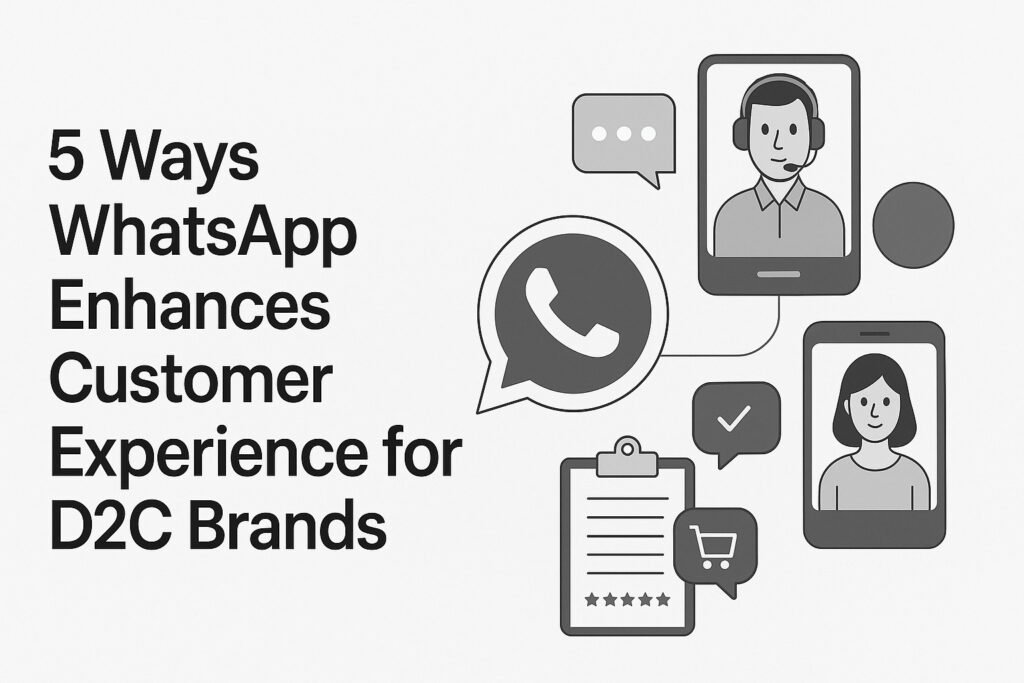
In the highly competitive world of direct-to-consumer (D2C) commerce, delivering a standout customer experience isn’t optional—it’s essential. Today’s consumers expect instant responses, personalized journeys, and seamless service across every touchpoint. This is where WhatsApp steps in as a powerful ally. Here are five impactful ways WhatsApp transforms customer experience for D2C brands. 1. Instant Customer Support, 24/7 WhatsApp enables real-time communication, eliminating the delays of email or call queues. Whether it’s pre-sales inquiries or post-purchase issues, customers can connect with your brand anytime. Benefits: With TheBotMode, you can deploy AI-powered chatbots or pre-set automated flows that answer FAQs, track orders, and escalate complex issues to human agents—ensuring customers feel supported around the clock. 2. Personalized Shopping Journeys Gone are the days of one-size-fits-all marketing. WhatsApp allows you to deliver personalized product recommendations and promotional messages based on browsing history and customer behavior. Example Scenarios: These timely, relevant messages feel more like a helpful nudge than a sales pitch—boosting engagement and conversions. 3. Seamless Order Updates and Notifications One of the simplest yet most appreciated features of WhatsApp for D2C brands is automated order communication. Keep customers informed at every step. Use Cases: These real-time alerts reduce customer anxiety and cut down support tickets asking, “Where is my order?” 4. Automated Feedback Collection Gathering feedback is critical for improving products and services, but long surveys often go ignored. WhatsApp simplifies the process with short, conversational prompts. How it helps: Using TheBotMode’s feedback automation, you can collect insights consistently without overwhelming the customer. 5. Human-Like Conversations at Scale WhatsApp Business API, combined with AI and chatbot technology, allows brands to scale conversations without losing the human touch. Key Features: This balance ensures personalized, efficient service—even at high volumes—while keeping operational costs under control. Conclusion For D2C brands, WhatsApp is not just a messaging tool—it’s a comprehensive platform to elevate customer experience. From instant support and personalized offers to automated updates and human-like interaction at scale, it empowers brands to build lasting customer relationships. With TheBotMode, you can unlock the full potential of WhatsApp Business API to deliver smarter, faster, and more delightful experiences in 2025 and beyond. FAQs Q1. How does WhatsApp improve customer satisfaction for D2C brands? By offering instant support, proactive updates, and personalized engagement, WhatsApp reduces friction and builds trust—resulting in improved customer satisfaction. Q2. Can small D2C brands use WhatsApp Business API effectively? Absolutely. Platforms like TheBotMode make it easy and affordable for small and mid-sized brands to automate conversations, support, and marketing on WhatsApp. Q3. Is it safe to send order updates and payment details over WhatsApp? Yes. The WhatsApp Business API is end-to-end encrypted and adheres to global standards for secure business communication. Q4. How can I automate customer service on WhatsApp? With TheBotMode, you can set up intelligent chatbot flows, quick reply buttons, ticketing systems, and escalation triggers—all within WhatsApp.
How to Build a High‑Performing WhatsApp Campaign in 2025
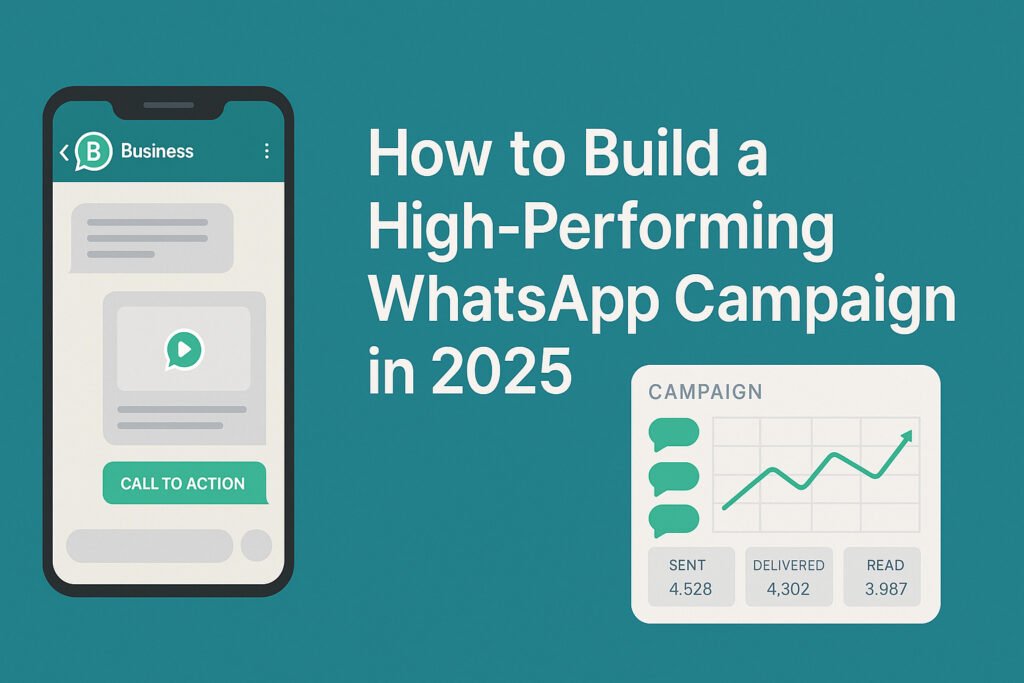
Introduction WhatsApp has emerged as one of the most impactful marketing channels in 2025, boasting unmatched open rates, real-time interactivity, and a massive global user base. For businesses looking to drive conversions and deepen customer relationships, creating a high-performing WhatsApp campaign is no longer optional—it’s essential. This guide will walk you through every step of building a successful campaign using the latest tools, strategies, and compliance standards. 1. Understanding WhatsApp Campaign Types (Promotional, Transactional, Conversational) WhatsApp campaigns fall into three main categories: Each type requires different message formats and approval via pre-approved templates for outbound messages. 2. Getting Started: API Setup & Access Businesses can choose between: API Requirements: You can use cloud-based or on-premises API solutions. In 2025, Meta has simplified onboarding through providers like TheBotMode. 3. Trend Spotlight: What’s New in 2025 4. Define & Segment Your Audience Use your CRM, website, or click-to-chat ads to build your opt-in list. Segment audiences by: Segmentation ensures relevance and improves engagement. 5. Template Design & Personalization Design templates that resonate with users: All outbound templates must be approved before use via Meta’s template review. 6. Timing & Scheduling Strategies Ensure frequency capping to avoid spam and high opt-out rates. 7. Rich Media & Interactive Messaging Enhance user experience using: Use multimedia to highlight USPs and product benefits quickly. 8. Automation vs Human Touch Leverage chatbots for: Hand off to human agents for: This hybrid model maximizes efficiency and customer satisfaction. 9. Compliance & Quality Control WhatsApp marketing is tightly regulated: 10. Analytics & Performance Optimization Track the following metrics: Use analytics dashboards provided by TheBotMode or Meta to refine your approach continuously. 11. Case Examples & Tools to Try Popular tools include: Use Cases: 12. Future Outlook: Ads & Monetization on WhatsApp WhatsApp will soon support: Integration with Meta’s ad suite allows for end-to-end user journeys starting from social ads to WhatsApp. Conclusion & Next Steps WhatsApp campaigns are indispensable in 2025. With the right API access, strategic segmentation, interactive content, and robust analytics, businesses can drive unmatched engagement and conversions. Next Steps: FAQs Do I need API or can I use the App? For large-scale or automated campaigns, API is required. The app is sufficient for basic manual outreach. How many messages can I send per day? Message limits depend on your quality rating and verified status. API tiers define your daily cap. Is WhatsApp campaign marketing legal in India? Yes, if you follow opt-in rules and DPDPA data protection laws. Can I add images and videos to messages? Yes, WhatsApp supports rich media in both transactional and promotional messages via the API.
WhatsApp CRM Integration: Manage Customer Data Like a Pro
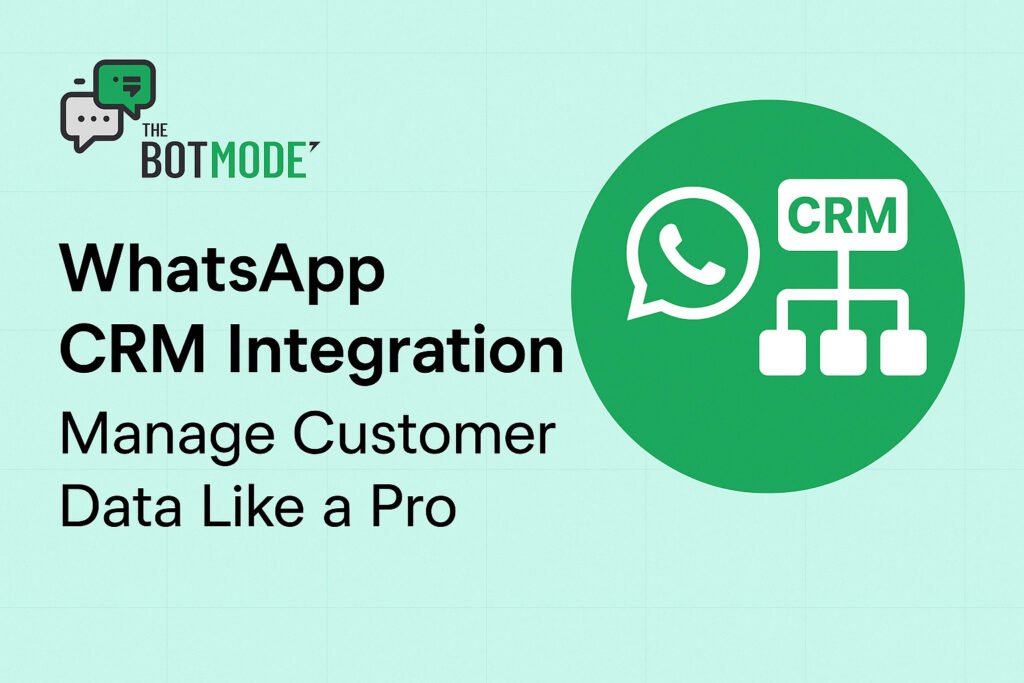
In today’s data-driven D2C world, managing customer information effectively is the secret to building long-term loyalty and increasing revenue. Integrating WhatsApp with your CRM system can revolutionize how you handle leads, conversations, and customer relationships. In this blog, we’ll show you how WhatsApp CRM integration works and why it’s a must-have for D2C brands looking to scale. Why WhatsApp CRM Integration Matters for D2C Brands D2C (Direct-to-Consumer) brands rely heavily on real-time conversations, fast responses, and personalized engagement. WhatsApp is already one of the most popular channels for communicating with customers. But without proper data management, messages can get lost, follow-ups can fail, and conversions can drop. That’s where CRM integration helps. Benefits of WhatsApp CRM Integration: Top CRMs That Work Seamlessly with WhatsApp Many modern CRMs now offer native or third-party WhatsApp integrations. Here are some commonly used ones: With TheBotMode’s automation tools, you can connect WhatsApp to these CRMs using ready-to-deploy APIs and no-code integrations. Use Cases: How D2C Brands Use WhatsApp CRM Integration 1. Lead Capture from WhatsApp Campaigns Run a WhatsApp ad or broadcast, and capture every inbound message directly into your CRM with name, phone number, and chat history. 2. Sales Funnel Automation Set up automated sequences in your CRM that trigger WhatsApp messages—like follow-ups, discount codes, or reminders. 3. Customer Support Tickets Convert WhatsApp chats into tickets in your CRM to assign agents, track resolution times, and improve customer satisfaction. 4. Personalized Product Recommendations Use purchase history and behavior data stored in CRM to send tailored product suggestions via WhatsApp. Step-by-Step: How to Integrate WhatsApp with Your CRM Why TheBotMode is the Best Tool for WhatsApp CRM Integration TheBotMode makes it easy to connect WhatsApp with your CRM—without technical hassles. Our platform offers: Whether you’re using HubSpot or Zoho, TheBotMode ensures your team never misses a lead or customer message. Final Thoughts Managing customer data manually across channels is outdated and inefficient. With WhatsApp CRM integration, you can deliver a smoother, faster, and more personalized customer experience. For D2C brands, it’s not just about messages—it’s about relationships. Start managing your customer data like a pro with TheBotMode’s WhatsApp automation and CRM integration solutions. FAQs: Q1. What is WhatsApp CRM integration? WhatsApp CRM integration is the process of connecting WhatsApp Business API with your CRM system to manage customer conversations, data, and workflows from one place. Q2. Can small D2C brands use WhatsApp CRM integration? Yes! With no-code tools like TheBotMode, even small D2C brands can automate and streamline their WhatsApp conversations. Q3. Is WhatsApp integration secure? Absolutely. WhatsApp Business API ensures end-to-end encryption and data privacy when connected to verified CRMs. Q4. How much does WhatsApp CRM integration cost? It depends on your CRM and WhatsApp API provider. TheBotMode offers affordable plans for startups and growing D2C brands. Q5. Can I track customer history in CRM from WhatsApp chats? Yes, with integration, all chat histories and customer interactions are logged in your CRM.
Top Metrics to Track WhatsApp Marketing ROI in 2025
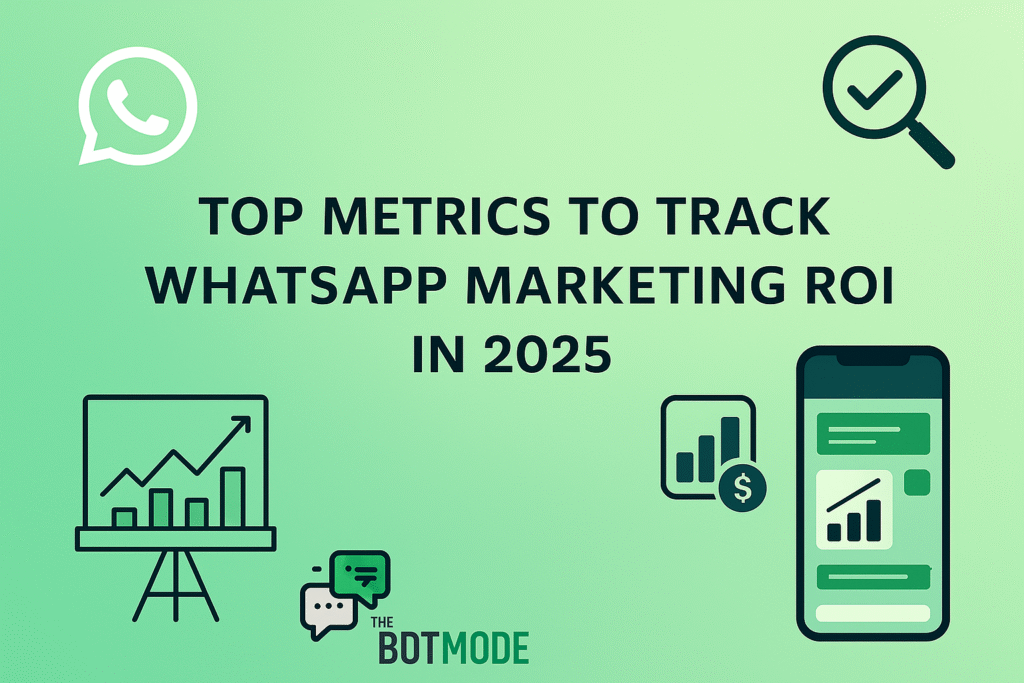
In 2025, data-driven marketing is no longer optional—it’s essential. As WhatsApp Business API becomes a dominant platform for D2C engagement, tracking WhatsApp marketing ROI helps you prove value, optimize performance, and scale efficiently. Whether you’re running broadcasts, drip campaigns, abandoned cart alerts, or support automation, these metrics will give you clarity and control over your WhatsApp performance. 1. Conversion Rate from WhatsApp Campaigns Why it matters: Conversion is the ultimate metric—whether it’s a sale, sign-up, or lead. This directly reflects ROI. Track: How The Bot Mode helps: With seamless Shopify, WooCommerce, and CRM integrations, you can trace every message back to revenue. 2. Message Open Rate Why it matters: WhatsApp messages outperform email with open rates above 90%. Still, tracking them helps optimize timing and templates. Track: Tip: Test send times and formats to improve open rate benchmarks. 3. Engagement Rate (Replies & Clicks) Why it matters: Engagement indicates trust and interest—core to conversion. Track: The Bot Mode Advantage: Our drag-and-drop builder visualizes flows, so you can pinpoint where users interact—and where they leave. 4. Retention and Repeat Interaction Rate Why it matters: Repeat engagement reflects real value and long-term ROI, not just one-time wins. Track: Use Case: If users reorder within 30 days of a WhatsApp nudge, that’s measurable ROI. 5. Cost per Acquisition (CPA) via WhatsApp Why it matters: CPA reveals efficiency—what you’re spending to get each new customer. Track: With The Bot Mode: You get real-time CPA dashboards and can automate retargeting to keep acquisition costs low. 6. Funnel Completion Rate Why it matters: From lead capture to purchase, funnel metrics show drop-off points and conversion health. Track: Optimization Tip: Trigger automated follow-ups for users who drop off midway. 7. Customer Satisfaction Score (CSAT) Why it matters: Happy users stay longer and convert more. CSAT helps measure the customer experience in real time. Track: Pro Tip: Use satisfaction triggers after support conversations or post-purchase flows. Why Choose The Bot Mode for WhatsApp Marketing ROI? At The Bot Mode, we don’t just help you send messages—we help you track, test, and scale them. Our tools include: With The Bot Mode, you’ll know what’s working—and why. Final Thoughts In 2025, WhatsApp marketing isn’t just about communication—it’s about conversion. With the right metrics and tools in place, you’ll scale your brand faster and smarter. Ready to track your WhatsApp marketing ROI with precision? FAQs Q1: What is a good ROI for WhatsApp marketing? A good ROI varies by industry, but D2C brands typically achieve 5x to 10x returns when flows are optimized with conversion tracking. Q2: How do I track conversions from WhatsApp? Tools like The Bot Mode track every user action—from message open to purchase—by integrating with your eCommerce and CRM systems. Q3: Which metrics should I monitor weekly? Track open rate, conversion rate, engagement, and funnel completion weekly. Review CPA and CSAT monthly. Q4: Can I measure ROI without sales data? You can estimate ROI based on lead generation and engagement, but linking to actual sales data offers the most accurate insights. Q5: What makes The Bot Mode ideal for WhatsApp marketing? It combines smart automation, visual flow-building, deep analytics, and one-click integrations with your existing stack. Book a Free Demo with TheBotMode













